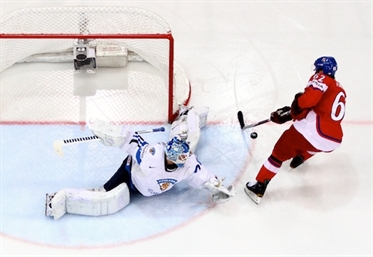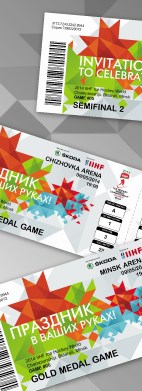Mission: shut the door
Mission: shut the door
Will CZE or FIN defend better in semi-finals?

 The Czech Republic beat the host Finns 3-2 for bronze in 2012, the last time these two nations faced each other. Expect another tight battle in the 2014 semi-final. Photo: Andre Ringuette / HHOF-IIHF Images
The Czech Republic beat the host Finns 3-2 for bronze in 2012, the last time these two nations faced each other. Expect another tight battle in the 2014 semi-final. Photo: Andre Ringuette / HHOF-IIHF Images
But you'd be much more likely to lose your shirt.
These two nations both pride themselves on their ability to shut the door, taking away the neutral zone and frustrating their opponents.
Of course, there are differences. The Finns take a more physical, straightforward approach reminiscent of the North American teams, while the Czechs tend to bide their time and wait for the counterattack.
Yet as Iiro Pakarinen’s 3-2 quarter-final winner against Canada showed, the Finns are perfectly capable of producing offence off opposition turnovers like Tyler Myers’ late giveaway.
“Every game has been a close game,” said Finnish captain Olli Jokinen, one of six players who suited up for the bronze-medal team in Sochi. “It was that way at the Olympics as well. We believe we can get even tighter in defence, help our goalie even more and make him even better.”
That’ll be hard to do, with Nashville Predators star Pekka Rinne already sporting a 1.70 GAA and 93.2 save percentage. (Talk about consistency: the towering goalie’s numbers right now almost exactly mirror what he posted in Germany 2010, where the Finns lost 2-1 in a quarter-final shootout with the late Jan Marek scoring the winner.)
On Thursday, Rinne turned into Canada’s worst nightmare with a 36-save performance.
In goal is where the Finns should have the biggest edge over the Czechs. Yes, like Rinne, starter Alexander Salak has posted two shutouts, but those came against Italy and Norway. And the SKA St. Petersburg netminder, with a 2.23 GAA and 89.7 save percentage, has to accept his share of blame for an overall malaise affecting coach Vladimir Ruzicka’s crew: a tendency to fall behind early or to blow seemingly secure leads.
For the sake of argument, let’s say the “ideal Czech game” resembles the 3-0 gold medal victory they posted under Ruzicka against a stacked Canadian lineup in Austria 2005.
Allowing Tyler Johnson to score twice as the Americans fought back to make it 4-3 in the 2014 quarter-final was certainly a divergence from that ideal. Sure, as Ruzicka said, the Czechs had been quite successful in “focusing on their neutral zone trap” up until that point, but late lapses nearly killed them.
Having to come back from a 3-0 deficit to beat France 5-4 in overtime wasn’t ideal. Leading Sweden 3-1 but losing 4-3 in sudden-death...spotting Canada a 4-1 lead before falling 4-3...surrendering a goal in the last minute of regulation to Denmark en route to a 4-3 shootout defeat. You get the picture. The Czechs have shown little consistency in shutting teams down here in Minsk.
Of course, as Jaromir Jagr observed after the victory over the Americans, the Finns haven’t exactly played textbook hockey either: “Finland, they didn’t have a good tournament, maybe just like us, but they made it. They’ve got new life, and that’s what we have. They’ve got nothing to lose.”
The Finns seem to be finding their game at just the right time. And, out of necessity, it’s scoring by committee for coach Erkka Westerlund’s group. They’re looking to KHL stars like Traktor Chelyabinsk’s Petri Kontiola, who leads the team with seven points, and Sibir Novosibirsk’s Jori Lehtera, whose three assists against Canada brought him up to five points. Jokinen is the only other player to have reached five points.
Although the Czechs’ offensive production hasn’t been mind-blowing either – 24 goals to Finland’s 21 – they have more weapons than their blue-and-white foes. None is more formidable than Jagr, the 42-year-old legend who sits sixth in all-time NHL scoring and is still one of hockey’s scariest talents. He tops the Czechs with seven points.
“I’m not really looking forward to playing against Jagr, to be honest,” Jokinen said. “He’s such a great player. He really loves the game. It’s amazing that he's still playing at this level. He’s seven years older than me and I know how much I have to do at my age just to lace up my skates every day. I can't imagine how he keeps doing it.”
Forward Vladimir Sobotka, who was injured in the quarter-final on a brutal hit by American captain Justin Abdelkader, said he plans to play against Finland. That would be a major plus, as Sobotka is tied with savvy blueliner Ondrej Nemec for second in team scoring (six points). Youngster Tomas Hertl (five points) and veterans Roman Cervenka and Jiri Hudler (four points) all have the ability to make life difficult if the Finnish defence coughs up the puck.
“The Czechs deserve to be there,” said Jokinen. “They have a lot of good players.”
With all that said, this game is less likely to be decided by one individual’s brilliance than by a team’s combination of wits and tenacity.
Historically speaking, the Czechs have the upper hand. They’ve won all three of the last encounters by one goal, including a 3-2 decision for bronze in Helsinki in 2012. As well, Finnish fans bitterly recall losing narrowly to the Czechs in the 1999 and 2001 finals.
Yet it’s also possible that edging Canada in the quarter-final the way the Finns did has prepared them better for the road ahead. If they can once again tap into the relentless mental toughness known as “sisu,” which Westerlund referenced in his post-Canada comments, Suomi could be playing for gold for the first time since its 2011 triumph in Bratislava.
Either way, it’ll be a hard-fought, tense game. Bet on it.
Back to Overview

















































































